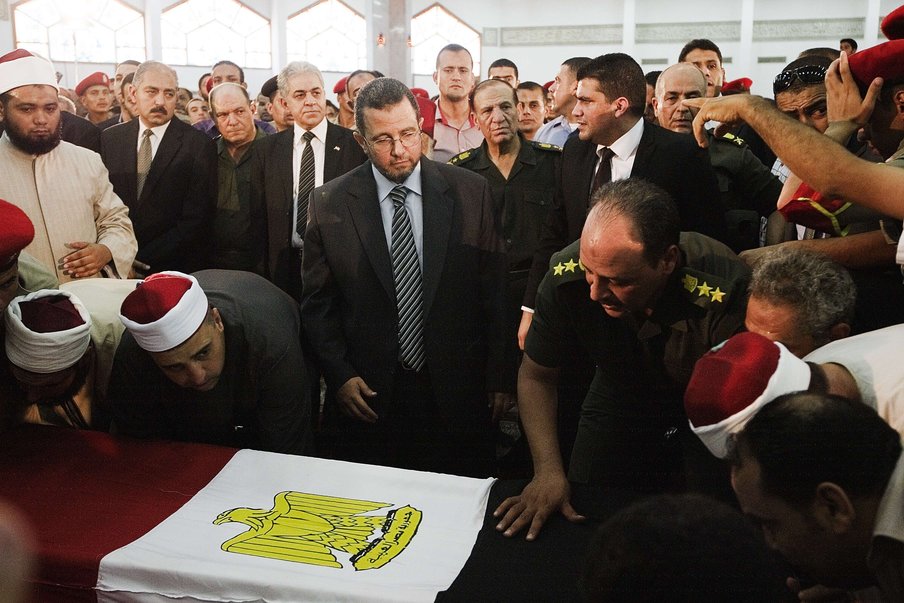CAIRO: An Egyptian rights group has said that an out of court settlement must not replace bringing to justice individuals who committed crimes in May during clashes over land in Minya.
“The holding of negotiations in order to reach an agreement about ownership of the land surrounding the Abo Fana Monastery – while it is extremely overdue – is a positive step, Hossam Bahgat, director of the Egyptian Initiative for Personal Rights (EIPR), said in a statement issued Wednesday.
“However, the terrible crimes committed during the dispute must not go unpunished if State officials are sincere in their desire that crimes such as these are not repeated, he continued.
At the end of May clashes over land surrounding the Abo Fana Monastery, Mallawi, broke out between monks and some 60 Bedouins living in the Qasr Hur village adjacent to the monastery.
A Muslim farmer, Khalil Mohamed Ibrahim, was shot dead during the clashes. The source of the gunfire which killed him remains unknown.
Investigations carried out by EIPR researchers revealed that seven monks were injured, two of them sustaining shrapnel wounds after they were shot, and suffered broken bones, muscle tears and bruising after being whipped, dragged and pelted with stones.
Three monks kidnapped by the Bedouins say that they were forced to spit at the cross and proclaim the Shehada, the Islamic declaration of faith.
In its statement EIPR calls on the public prosecutor to pursue impartial criminal investigations into the events, and to send to trial those accused of having committed crimes during the events.
The Mallawi public prosecution office is today scheduled to consider the renewal of the detention of 15 individuals accused of murder and attempted murder, aggravated kidnapping, illegal possession of weapons and ammunition, assault on a place of worship and burning of its subsidiary buildings and destruction of crops.
The dispute over the land began several years ago when the Monastery began construction of a wall around neighboring property.
While the Monastery says that it has received official approval for the wall, Muslim residents of Mallawi claim that they own the land and that the wall will damage agricultural crops.
Minya Governor Ahmed Diaa Eddin sought to downplay the incident at the time, saying during an interview broadcast on Egyptian satellite channel Dream, “This was a fight between two neighbors and nothing else.
However, Minya has witnessed previous sectarian clashes: 15 people were wounded and 35 arrested during clashes which broke out last year.
“While we are aware that the dispute over the Monastery’s land did not begin for religious reasons, the kidnapping and physical assault of monks, debasement of their religious beliefs and destruction of their church are all despicable sectarian crimes which set a dangerous precedent and are likely to be repeated if the perpetrators are not punished, Bahgat says in the EIPR statement.
The statement also makes reference to the report issued by the Egyptian National Council for Human Rights last month which criticized shortcomings in the authorities’ handling of sectarian attacks and which is limited to “reconciliation meetings and security-based solutions.
Dr Naguib Gabriel, lawyer and head of the Egyptian Human Rights Union, echoed this.
“There is no security or political solution to this problem, rather it must be dealt with through an understanding of citizenship, Gabriel told Daily News Egypt.
“The state is responsible for protecting the monks, not the Bedouin, and any compensation, negotiations or exchange of land must happen through the state, he continued.
Gabriel criticized the lack of transparency surrounding the negotiations which are currently going on between the disputing sides of the Abo Fana incident.
“People have appointed themselves negotiators on behalf of the Monastery and the Bedouin without any right to do so, Gabriel explained.
“We don’t know who is involved in the negotiations – there’s a complete lack of transparency.
“A legal route must be taken to solve this problem, he said.
